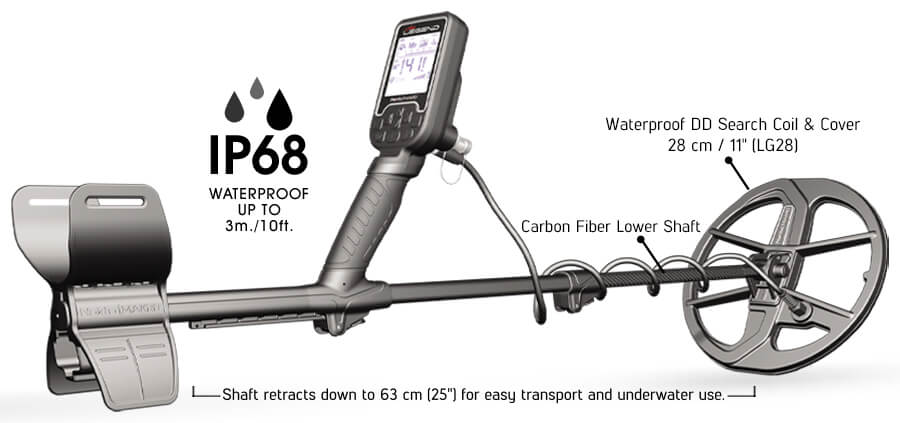One of the great thrills of beach hunting is that “big one” that always awaits… your chance to strike it rich. I’m very serious when I suggest that you always be on the alert for treasure stories and legends. Don’t ignore those tales of missing treasures…of great losses and “almost” or partial recoveries. Not only will this add excitement to your hobby, but the stories sometimes prove to be true!
Before you spend too much time seeking the mythical “pot o’ gold,” however, you should attempt to verify the sea story you are following. Major concerns before you get yourself seriously involved in tracking legends are, first, to make certain that the treasure ever actually existed; then, to locate the precise spot where it is rumored to have been lost or where it was only partially recovered. Remember that beaches run for miles and that names of various areas can change regularly. Also, the appearance of beaches change. Erosion may take years to alter a beach radically, but storms can transform its appearance in just a few hours.
Investigate stories and legends before ever turning on your metal detector. Check newspapers, police records, historical societies, local coin shops. Uncover sufficient information to convince yourself beyond the shadow of a doubt that the facts are correct. Then, you can pursue the tale, knowing that what you are searching for actually exists. When you locate unusual treasures on the beach, look more closely at nearby land and sea areas; you may have located a sunken treasure ship!
Schedule your beachcombing expeditions according to current (hourly) weather reports. Stay alert to weather forecasts and go prepared to withstand worst.
Plan your treasure hunting expedition. Make a list of all you will need the day before you make the trip and check all gear carefully before you leave.
Always put batteries at the head of your list (see above). And, always check your batteries first if your detector should stop working. Some hobbyists take these longer life batteries for granted and expect them to last forever. Believe me, they won’t. You’d be amazed at how many broken detectors can be “repaired” with new batteries.
Take along a friend, if possible. If you go alone, leave word where you’ll be. Always carry identification that includes one or more telephone numbers or persons to call (with a quarter for the pay phone taped to the list). Your personal doctor’s name should be on this list.
Be wary of driving in loose sand. Carry along a towrope and a shovel. You may need someone to pull you out of trouble, or you may have to dig ramps for your wheels if a tow vehicle isn’t handy.
If there are no regulations to the contrary, you may want to search among crowds. But, don’t annoy anyone. Angering the wrong person can result in immediate trouble, or you may find a complaint filed against you personally and the metal detector fraternity in general. You certainly wouldn’t want to cause a beach to be put off limits for metal detecting.
Whenever possible, return any find to its owner. Try to oblige when someone asks your help in recovering a lost article. It might be feasible for you to loan them your detector and teach them how to use it. Who know? You might add a new member to our brotherhood. When helping look for a lost article, it’s a good idea to keep its owner close by throughout the search so that they will know whether you succeed or not. If you can’t find the article, get their name or address; you might find it another day.
Do not enter posted or “No trespassing” beaches without obtaining permission. Even in states where you are certain that all beaches are open to the public, do not search fenced or posted areas without permission. Never argue with a “loaded shotgun;” leave such property owners to themselves.
Finally, remember that modern metal detector is a wonderful scientific instrument. It searches beneath the sand, where you cannot see. It is always vigilant about the presence of metal. But, no detector can “do it all.” You must develop powers of observation that keep you attentive to what a detector cannot see. Watch for the unusual! Sometimes you’ll visually locate money, marketable seashells or other valuables. The real benefit of developing keen powers of observation, however, is to enable you to enjoy the glories of the beach to their fullest and never to overlook the signposts pinpointing to detectable treasure.
As you scan along the waterline and observe the sands under the water, you may eye a coin shining in the water. Check the spot with your detector. Perhaps you ground only a freshly dropped coin, or it could be the top layer of much greater treasure. And, how about that rock outcropping, the gravel or shells peeking through the sand, that accumulation of debris…any of these might mark the location of a glory hold. Remain alert and be rewarded!
There’s treasure to be found near the water! And, vast amounts are waiting…enough for all. I sincerely hope that you’ll join the rest of us beachcombers in searching for this lost and hidden wealth. When you do, perhaps I’ll see you on the beach!

